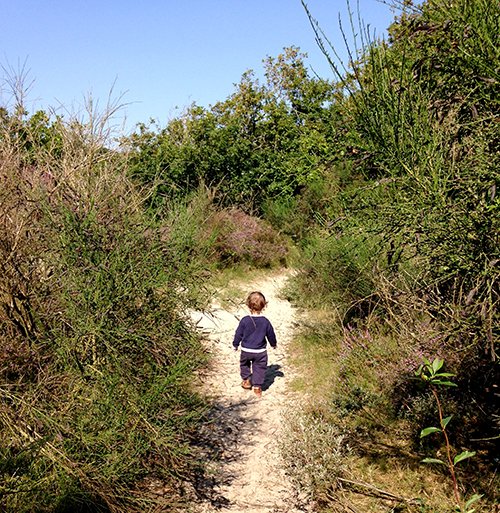Less stressful, More respectful - RIE caregiving

When TheYoungOne was expected, and in his earliest months, attachment parenting seemed to us like a great cluster of ideas as an alternative to traditional/mainstream parenting practices. These ideas - like lots of physical contact, gentleness - were a better match with our intuitions about caring for a baby than the default ideas floating around in our part of the world. So we adopted a lot of the attachment parenting practices. But it was extremely tough. We wore ourselves out and felt miserable.
Relatively recently we came across the RIE school of thought about child care. In retrospect this is a far better fit for us and our boy. If we’d been aware of this material earlier we’d have done things differently.
If your child is absorbed in autonomous play, resist the temptation to join in or help. Do less. Don’t make it about you.
RIE stands for the awkward portmanteau ’Resources for Infant Educarers’. Like attachment parenting RIE also contradicts much of conventional parenting wisdom, probably even more of it. It's also similar with respect to its council to abstain from using violence and punishment.
From what I’ve learned so far it differs from attachment parenting primarily in a very strong emphasis on treating a baby/child with respect and helping to foster its autonomy. This focus leads to some pieces of advice which may not be immediately intuitive and can take practice to internalise, for instance:
Try not to comment on your kid’s behaviour using value judgements, even positive ones like 'Good job!’
If your kid takes another’s toy, or has his own toy taken, or refuses to give something to another, don’t automatically intervene to enforce sharing, justice or ‘playing nice’. Instead give kids a chance to figure out a peaceful resolution to the conflict on their own (as long as no one’s getting physically hurt) and respect their resolution even if it seems unjust to you.
If your child is absorbed in autonomous play, resist the temptation to join in or help. Do less. Don’t make it about you.
Try to avoid value judgements, even positive ones like 'Good job!’
- Expect crying even when the caregiving basics (food, warmth, pain) have been taken care of. Your job isn’t to stop the crying, but to be supportive throughout it. Crying will often be triggered when you're calmly enforcing limits (RIE is compassionate, but not permissive parenting).
Your parents may have tried to stop you from crying when you were a baby. Perhaps they gave you a pacifier, or kept trying to feed you, or jiggled you every time you cried, thinking this was what you needed at the moment. Perhaps they tried to distract you with toys, music, or games, when all you needed was their undivided attention and loving arms so that you could continue with your crying.
Aletha Solter, Aware Parenting
- Always announce in advance what’s going to happen, when it impacts on your child, preferably in advance. Even if it seems like a trivial thing to you e.g. 'Soon we’re going to go and change your nappy’.
So far our kid seems much happier since we’ve been consciously working on making these kinds of changes, and they feel better for us too.
There's a ton of often contradictory advice about the best way to interact with a child in your care, I understand if the thought of even more of it might be daunting. But if you've read this far I think there's a good chance you'd appreciate Janet Lansbury's RIE site. The works of Magda Gerber and Emmi Pikler are worth looking at too.
This post is based on an article I originally published here.
Thanks for this post! I also follow the RIE principles with my son. I discovered RIE when he was 9 months old and it was a total game changer. Improved my relationship with him and increased the harmony of our family.